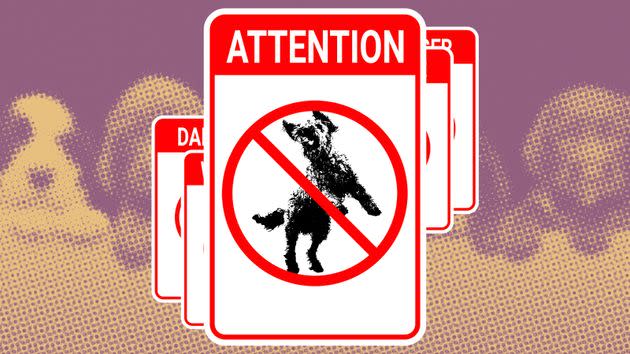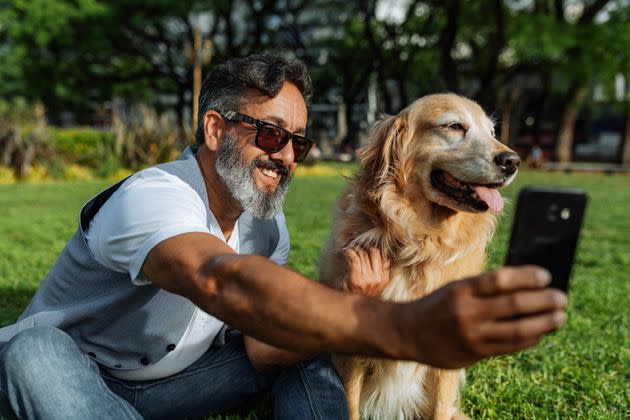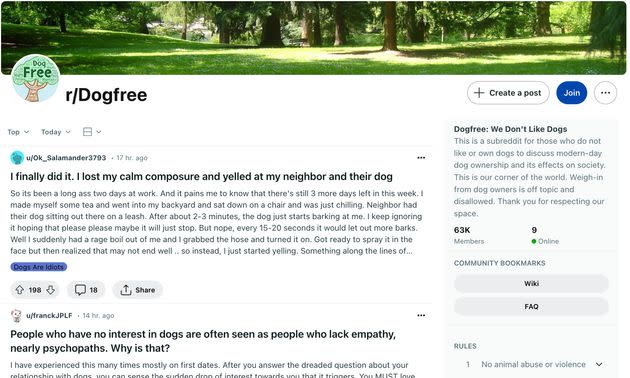If You Judge Someone For Not Liking Dogs, Here's What It Says About You

In the era of dog moms, “dog dads” and “fur babies,” admitting you don’t like dogs is only for the brave.
Disinterested in cats? No one cares, they’re weird and function well as loners anyway. But if you don’t like dogs and go so far as to say it in public or online, be prepared to get excoriated.
That’s in part because so many of us live with dogs and see them as an integral part of our lives. As of 2022, 44.5% of U.S. households include dogs, and about half of those people consider their pets a part of their family, according to a 2023 Pew survey.
Culturally, we assume that having a dog suggests a sort of inherent goodness in its owner and dock morality points off someone who doesn’t like dogs. Think of how many times in the last few years you’ve heard any of the following:
“I can’t trust someone who doesn’t like dogs.”
“I like dogs more than I like people.”
“We don’t deserve dogs.”
“If my dog doesn’t like you, I don’t like you.”
“Must love dogs” written a dating app
“People believe that someone who has a good relationship with a dog must be a good person, because they believe animals can judge character,” Andrew Hager, director at the Presidential Pet Museum, told HuffPost in 2019 in a story on why we expect presidents to own dogs. (Own them, not shoot them. Sorry, Kristi Noem.)
“You see this play out all the time in movies, where dogs growl at the bad guy,” Hager said.
The moral weight we attach to an appreciation for dogs plays out on dating apps, too: Profiles with a dog in the profile picture are statistically more likely to get matches and messages than profiles without a dog pictured.

“The exact reason for this phenomenon is unknown, but it seems that people may associate having a dog with caregiving, credibility and higher social approachability,” said Kerri Rodriguez, a human-animal bond researcher and assistant professor at the College of Veterinary Medicine at the University of Arizona.
Interestingly, a study tried to replicate this finding with cats but found that women rated pictures of men with cats as less datable, less masculine, less extroverted, and more neurotic than the same picture without a cat.
Some of the distrust of dog-dislikers is derived from the notion that dogs were born to be “man’s best friends,” and that our species have co-evolved in a sacred, ancient bond, said Monique Udell, the director of the Human-Animal Interaction Lab at Oregon State University.
“That idea can lead to judgment of both people who don’t like dogs and of dogs who don’t like to be touched, cuddled or exhibit less social behavior around people,” she said. “It’s really not fair to anyone.”
Perhaps there’s no better evidence that disliking dogs will earn you social pariah status than the existence of r/Dogfree. On the Reddit forum ― a dog-owner-free community with more than 63,000 users ― people commiserate over how frustrating it is to feel socially pressured to like other people’s dogs and the ills of modern pet ownership.
“Your dog is not your child so please stop calling it a fur baby,” one post reads.
“The smell of dogs is something I can’t comprehend living with,” another is subject-lined. (There’s also plenty of less catty posts: Links to dog attacks in the news and sobering personal anecdotes like, “I buried my cat today because people don’t know how to follow leash laws” are common, too.)

The folks on r/Dogfree ― many of whom who firmly believe dogs are parasitic to society and do more harm than good, especially to other animal species ― would probably love science journalist Stephen Budiansky’s 2000 book “The Truth About Dogs,” which details the the co-evolution of canines and humans.
For at least 32,000 years, mankind has been domesticating the lone wolf into the animals we know as modern dogs today, but Budiansky argues that the evidence strongly suggests that “proto-dogs” were the ones pulling the strings, intuitively aware that “mooching off people” beat “fighting it out in the wild.”
Primitive humans, he writes, “with their campfires and garbage heaps and hunting practices, but above all with their social interactions, represented an ecological niche ripe for exploitation.”
At this point, I should probably reveal my bias: I absolutely love dogs. But even I have to admit that dog owner culture has gotten a bit ... weird: There’s dogs in strollers, non-service dogs sitting on people’s laps inside restaurants, “dog parents” who joke that they work just to give their dog a better life, dogs invading other people’s personal spaces because they aren’t on leashes (or they’re on ineffective, long retractable leashes).
Reading some of the threads on r/Dogfree, I had to admit the haters made some good points: In most cases, it’s not the dogs that are the problems so much as entitled, dismissive dog people and dog culture gone mad.
Of course, for some, it is about the dogs. Sunflower Bryant, a comedian and video creator, has long harbored a dislike for dogs. She doesn’t like their scent, the incessant barking, how often they lick and jump on people and their total disregard for boundaries.
“Then, philosophically, I think it’s messed up that we bred wolves into pugs,” she said. “The way we domesticated dogs so they can’t survive in the wild and can barely function physically depending on the breed, is just cruel. It’s not dogs’ fault.”

In 2013 ― back when she was an “edgy early 20-something” ― Bryant created a YouTube video titled “why I hate dogs.” That was 11 years ago, but the video is still raking in comments and messages almost daily.
“Most people who comment are relieved to have someone agree with them and often share stories about their trauma with dogs,” she said. “However I do get some really angry and hurt comments from dog people, too.”
Offline, Bryant hates how people will rush to defend their dog’s unruly behavior instead of actually hearing a request from a fellow human to make them feel more comfortable.
She thinks there’s some narcissism at play when someone reacts badly to an admission of not being into dogs. If you think of your dog as your child, or at the very least, a part of your family, they’re a reflection of you.
“Also, dog people are expected to train their dogs, so when you critique a dog’s behavior, you really are critiquing the owner in a way,” she said. “It’s the prioritizing of dogs’ comfort over people that baffles me.”
Bryant wishes that dog people would learn to accept other people’s preferences and need for personal space. She’d never allow her cat to jump on someone who doesn’t like cats, and she’s never offended when people tell her they don’t like cats, which they frequently do.
“If someone doesn’t like horror movies, you hopefully wouldn’t say, ‘Well, this horror movie is basically a comedy!’ and refuse to turn it off,” she said. “Someone not liking what you like isn’t personal, and your dog also doesn’t care if someone doesn’t like them.”
!["Dog culture is so normalized now, having a different opinion seems like you committed a crime to [dog owners]," <a href="https://www.instagram.com/fahkiyo/" rel="nofollow noopener" target="_blank" data-ylk="slk:said Fikayo;elm:context_link;itc:0;sec:content-canvas" class="link ">said Fikayo</a><a href="https://www.instagram.com/fahkiyo/" rel="nofollow noopener" target="_blank" data-ylk="slk:Aiyegoro;elm:context_link;itc:0;sec:content-canvas" class="link ">Aiyegoro</a>, a content creator from Dallas, Texas <span class="copyright">Purple Collar Pet Photography via Getty Images</span>](https://s.yimg.com/ny/api/res/1.2/A5NqhsQQvouNopJxu85hXQ--/YXBwaWQ9aGlnaGxhbmRlcjt3PTk2MDtoPTY0MA--/https://media.zenfs.com/en/the_huffington_post_584/5d9c8c5f76f7bad85abc3423d721873a)
Of course, it’s not all just personal preferences. Some people are allergic to dogs. Others stay clear of dogs because they belong to a religion that considers dogs ritually unclean. Some have had negative past experiences ― namely, getting bit.
Fikayo Aiyegoro, a content creator from Dallas, Texas, had to go to the hospital after being attacked by a neighborhood dog when he was a kid.
“Dog culture is so normalized now, having a different opinion seems like you committed a crime to [dog owners],” he said.
Given his past experiences, Aiyegoro has no time for dog people’s fussiness.
“When I say I’m not a dog person and people always ask me why, I tell them, ‘Why am I going to waste money and resources treating an animal like a baby that came from me?’” he said.
Juliane Bergmann, a writer from Montana, is dog agnostic living in a full-on “dog city.” It’s a place where companies advertise that you can bring your dog to work as a perk for applicants.The last time she checked, her community had 13 dog parks, and dogs basically own the hiking trails.
“When I tell people that I’m not a dog person, people just look at me like I don’t belong,” she said. “Others think I’m kidding, are confused about why I live here, or just stop engaging.”
When asked why she doesn’t like dogs, she tells people it really isn’t that deep: It’s just a preference, like for a color or ice cream flavor or travel destination.
“Just because I don’t like dogs, some people assume I hate them or would mistreat them,” she told HuffPost. “Instead, not liking dogs means I feel neutral towards dogs, just like cats, and other animals, and most people, too.”
More than anything, Bergmann wishes dog parents would do a better job of controlling their “children.”
“Would you let your kid jump on someone and lick them and yell in their face and sniff their crotch? Of course not,” she said.
“It’s your job to make sure your dog isn’t a jerk to everyone, doesn’t litter parks with shit piles, doesn’t keep up the entire neighborhood by barking, or cause collisions between hikers and bikers on the trails just because they’re running off-leash,” she said.
We need to rein in on our disdain for people who don’t like dogs.
Even Karen B. London ― a certified applied animal behaviorist and the author of “Treat Everyone Like a Dog: How a Dog Trainer’s World View Can Improve Your Life” ― is flummoxed by how much meaning people draw from an affinity or dislike for dogs.
“I honestly don’t think that people who love dogs are necessarily better people than those who don’t,” she said.
It’s common to hear people say that dogs love unconditionally or that dogs are so pure of heart and full of goodness, but London thinks people aren’t seeing the full picture when it comes to dogs.
“Many people just don’t recognize that dogs can be grumpy, rude, manipulative, greedy and that they can clearly express their desire to get away,” she said. “I say this as a true dog lover.”
Dogs are nuanced, and those nuances aren’t going to be universally loved.
“Without understanding dog behavior and canine body language, it’s all too easy to imagine all dogs are innately noble and good in a simple way rather than being the complex, interesting individuals we know them to be,” London said.
Beverly Ulbrich, a dog trainer and behaviorist, doesn’t think dog owners who’ve properly trained their dogs well should be grouped in with the owners who let their dog run roughshod in public.
“It certainly does get tiring when I have to tell people that my tail-wagging little 12-pound fluffy schnauzer is friendly and they don’t have to run away when they’re delivering food, for instance,” she said.
Ulbrich’s dog is actually trained to take the food or other deliveries from the drivers. (The dog, named Musik and pictured below, is also an animal actor ― even dog haters have to respect a dog who brings home the bacon.)
“Most of of the delivery people I get are thrilled with that and say that it makes their day, but then there are others that won’t come up the steps because there’s this little happy dog there,” she said.
Ultimately, Ulbrich respects people who have fear of dogs, but she feels a little sad for them. If they’re willing to interact, she and Musik are more than happy to help them with their fears.
“[Dogs] teach us how to live in the moment and how to experience everything with tremendous joy and positive anticipation ― even Jane Goodall says that dogs are her favorite animal, not chimpanzees!” she said.
As dogs become more ingrained in our daily lives and public spaces, Udell, the animal behaviorist, says that it’s important to consider those who may feel uncomfortable around dogs and how we can be respectful of those with fears, allergies or just generally different preferences.
If anything, the close relationship many of us share with dogs is the real puzzle, Udell said.
“They’re an entirely different species that sheds, slobbers and has a knack for taking up your whole bed if you allow it!” she said. “So when encountering someone who doesn’t love dogs, it may be an opportunity to reflect on just how incredible it is that you do.”

